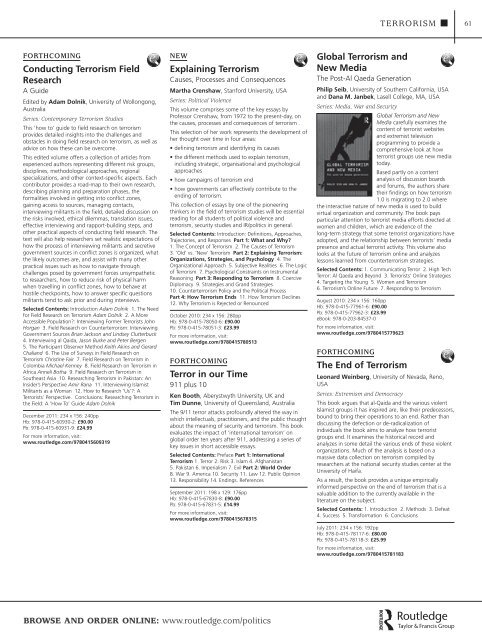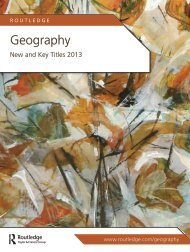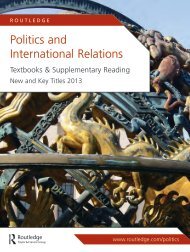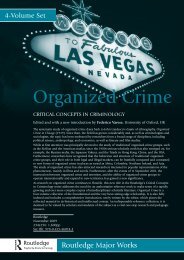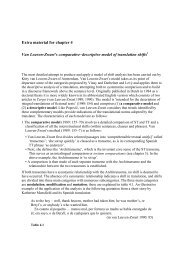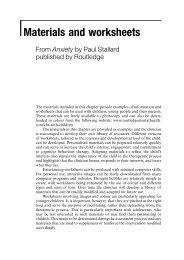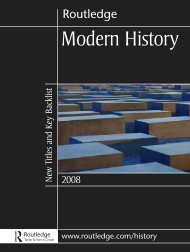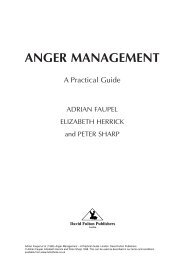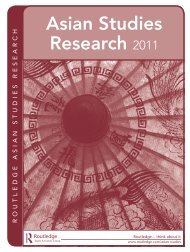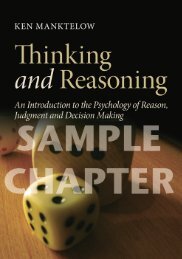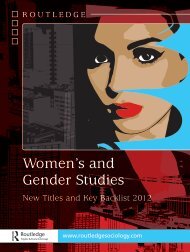Politics and International Relations 2011 (UK) - Routledge
Politics and International Relations 2011 (UK) - Routledge
Politics and International Relations 2011 (UK) - Routledge
You also want an ePaper? Increase the reach of your titles
YUMPU automatically turns print PDFs into web optimized ePapers that Google loves.
ForthcomiNg<br />
Conducting Terrorism Field<br />
Research<br />
A Guide<br />
Edited by Adam dolnik, University of Wollongong,<br />
Australia<br />
Series: Contemporary Terrorism Studies<br />
This ’how to’ guide to field research on terrorism<br />
provides detailed insights into the challenges <strong>and</strong><br />
obstacles in doing field research on terrorism, as well as<br />
advice on how these can be overcome.<br />
This edited volume offers a collection of articles from<br />
experienced authors representing different risk groups,<br />
disciplines, methodological approaches, regional<br />
specializations, <strong>and</strong> other context-specific aspects. Each<br />
contributor provides a road-map to their own research,<br />
describing planning <strong>and</strong> preparation phases, the<br />
formalities involved in getting into conflict zones,<br />
gaining access to sources, managing contacts,<br />
interviewing militants in the field, detailed discussion on<br />
the risks involved, ethical dilemmas, translation issues,<br />
effective interviewing <strong>and</strong> rapport-building steps, <strong>and</strong><br />
other practical aspects of conducting field research. The<br />
text will also help researchers set realistic expectations of<br />
how the process of interviewing militants <strong>and</strong> secretive<br />
government sources in conflict zones is organized, what<br />
the likely outcomes are, <strong>and</strong> assist with many other<br />
practical issues such as how to navigate through<br />
challenges posed by government forces unsympathetic<br />
to researchers, how to reduce risk of physical harm<br />
when travelling in conflict zones, how to behave at<br />
hostile checkpoints, how to answer specific questions<br />
militants tend to ask prior <strong>and</strong> during interviews.<br />
Selected Contents: Introduction Adam Dolnik 1. The Need<br />
for Field Research on Terrorism Adam Dolnik 2. A More<br />
Accessible Population?: Interviewing Former Terrorists John<br />
Horgan 3. Field Research on Counterterrorism: Interviewing<br />
Government Sources Brian Jackson <strong>and</strong> Lindsey Clutterbuck<br />
4. Interviewing al Qaida, Jason Burke <strong>and</strong> Peter Bergen<br />
5. The Participant Observer Method Keith Akins <strong>and</strong> Gerard<br />
Chali<strong>and</strong> 6. The Use of Surveys in Field Research on<br />
Terrorism Christine Fair 7. Field Research on Terrorism in<br />
Colombia Michael Kenney 8. Field Research on Terrorism in<br />
Africa Anneli Botha 9. Field Research on Terrorism in<br />
Southeast Asia 10. Researching Terrorism in Pakistan: An<br />
Insider’s Perspective Amir Rana 11. Interviewing Islamist<br />
Militants as a Woman 12. How to Research ’Us’?: A<br />
Terrorists’ Perspective. Conclusions: Researching Terrorism in<br />
the Field: A ’How To’ Guide Adam Dolnik<br />
December <strong>2011</strong>: 234 x 156: 240pp<br />
Hb: 978-0-415-60930-2: £90.00<br />
Pb: 978-0-415-60931-9: £24.99<br />
For more information, visit:<br />
www.routledge.com/9780415609319<br />
New<br />
Explaining Terrorism<br />
Causes, Processes <strong>and</strong> Consequences<br />
Martha Crenshaw, Stanford University, USA<br />
Series: Political Violence<br />
This volume comprises some of the key essays by<br />
Professor Crenshaw, from 1972 to the present-day, on<br />
the causes, processes <strong>and</strong> consequences of terrorism .<br />
This selection of her work represents the development of<br />
her thought over time in four areas:<br />
• defining terrorism <strong>and</strong> identifying its causes<br />
• the different methods used to explain terrorism,<br />
including strategic, organisational <strong>and</strong> psychological<br />
approaches<br />
• how campaigns of terrorism end<br />
• how governments can effectively contribute to the<br />
ending of terrorism.<br />
This collection of essays by one of the pioneering<br />
thinkers in the field of terrorism studies will be essential<br />
reading for all students of political violence <strong>and</strong><br />
terrorism, security studies <strong>and</strong> IR/politics in general.<br />
Selected Contents: Introduction: Definitions, Approaches,<br />
Trajectories, <strong>and</strong> Responses Part 1: What <strong>and</strong> Why?<br />
1. The Concept of Terrorism 2. The Causes of Terrorism<br />
3. ’Old’ vs. ’New’ Terrorism Part 2: Explaining Terrorism:<br />
Organizations, Strategies, <strong>and</strong> Psychology 4. The<br />
Organizational Approach 5. Subjective Realities 6. The Logic<br />
of Terrorism 7. Psychological Constraints on Instrumental<br />
Reasoning Part 3: Responding to Terrorism 8. Coercive<br />
Diplomacy 9. Strategies <strong>and</strong> Gr<strong>and</strong> Strategies<br />
10. Counterterrorism Policy <strong>and</strong> the Political Process<br />
Part 4: How Terrorism Ends 11. How Terrorism Declines<br />
12. Why Terrorism is Rejected or Renounced<br />
October 2010: 234 x 156: 280pp<br />
Hb: 978-0-415-78050-6: £90.00<br />
Pb: 978-0-415-78051-3: £23.99<br />
For more information, visit:<br />
www.routledge.com/9780415780513<br />
ForthcomiNg<br />
Terror in our Time<br />
911 plus 10<br />
Ken Booth, Aberystwyth University, <strong>UK</strong> <strong>and</strong><br />
Tim dunne, University of Queensl<strong>and</strong>, Australia<br />
The 9/11 terror attacks profoundly altered the way in<br />
which intellectuals, practitioners, <strong>and</strong> the public thought<br />
about the meaning of security <strong>and</strong> terrorism. This book<br />
evaluates the impact of ‘international terrorism’ on<br />
global order ten years after 911, addressing a series of<br />
key issues in short accessible essays.<br />
Selected Contents: Preface Part 1: <strong>International</strong><br />
Terrorism 1. Terror 2. Risk 3. Islam 4. Afghanistan<br />
5. Pakistan 6. Imperialism 7. Evil Part 2: World Order<br />
8. War 9. America 10. Security 11. Law 12. Public Opinion<br />
13. Responsibility 14. Endings. References<br />
September <strong>2011</strong>: 198 x 129: 176pp<br />
Hb: 978-0-415-67830-8: £90.00<br />
Pb: 978-0-415-67831-5: £14.99<br />
For more information, visit:<br />
www.routledge.com/9780415678315<br />
Browse <strong>and</strong> order online: www.routledge.com/politics<br />
terrorism<br />
Global Terrorism <strong>and</strong><br />
New Media<br />
The Post-Al Qaeda Generation<br />
Philip Seib, University of Southern California, USA<br />
<strong>and</strong> dana M. Janbek, Lasell College, MA, USA<br />
Series: Media, War <strong>and</strong> Security<br />
Global Terrorism <strong>and</strong> New<br />
Media carefully examines the<br />
content of terrorist websites<br />
<strong>and</strong> extremist television<br />
programming to provide a<br />
comprehensive look at how<br />
terrorist groups use new media<br />
today.<br />
Based partly on a content<br />
analysis of discussion boards<br />
<strong>and</strong> forums, the authors share<br />
their findings on how terrorism<br />
1.0 is migrating to 2.0 where<br />
the interactive nature of new media is used to build<br />
virtual organization <strong>and</strong> community. The book pays<br />
particular attention to terrorist media efforts directed at<br />
women <strong>and</strong> children, which are evidence of the<br />
long-term strategy that some terrorist organizations have<br />
adopted, <strong>and</strong> the relationship between terrorists’ media<br />
presence <strong>and</strong> actual terrorist activity. This volume also<br />
looks at the future of terrorism online <strong>and</strong> analyzes<br />
lessons learned from counterterrorism strategies.<br />
Selected Contents: 1. Communicating Terror 2. High Tech<br />
Terror: Al Qaeda <strong>and</strong> Beyond 3. Terrorists’ Online Strategies<br />
4. Targeting the Young 5. Women <strong>and</strong> Terrorism<br />
6. Terrorism’s Online Future 7. Responding to Terrorism<br />
August 2010: 234 x 156: 160pp<br />
Hb: 978-0-415-77961-6: £90.00<br />
Pb: 978-0-415-77962-3: £23.99<br />
eBook: 978-0-203-84537-0<br />
For more information, visit:<br />
www.routledge.com/9780415779623<br />
ForthcomiNg<br />
The End of Terrorism<br />
Leonard Weinberg, University of Nevada, Reno,<br />
USA<br />
Series: Extremism <strong>and</strong> Democracy<br />
This book argues that al-Qaida <strong>and</strong> the various violent<br />
Islamist groups it has inspired are, like their predecessors,<br />
bound to bring their operations to an end. Rather than<br />
discussing the defection or de-radicalization of<br />
individuals the book aims to analyze how terrorist<br />
groups end. It examines the historical record <strong>and</strong><br />
analyzes in some detail the various ends of these violent<br />
organizations. Much of the analysis is based on a<br />
massive data collection on terrorism compiled by<br />
researchers at the national security studies center at the<br />
University of Haifa.<br />
As a result, the book provides a unique empirically<br />
informed perspective on the end of terrorism that is a<br />
valuable addition to the currently available in the<br />
literature on the subject.<br />
Selected Contents: 1. Introduction 2. Methods 3. Defeat<br />
4. Success 5. Transformation 6. Conclusions<br />
July <strong>2011</strong>: 234 x 156: 192pp<br />
Hb: 978-0-415-78117-6: £80.00<br />
Pb: 978-0-415-78118-3: £25.99<br />
For more information, visit:<br />
www.routledge.com/9780415781183<br />
61


